Economic Policies and Micro/Small Business Market Structures
VerifiedAdded on 2023/04/07
|20
|1058
|452
Report
AI Summary
This report provides an analysis of the impact of expansionary and contractionary fiscal and monetary policies on micro and small businesses. It explores how government spending, tax changes, and interest rate adjustments influence business growth, consumerism, and overall economic stability. The report examines the adaptability of small businesses to changing economic climates, their contribution to economic growth, and the potential for future expansion. Furthermore, it discusses different types of market structures, including perfect competition, monopolistic competition, oligopoly, and monopoly, and their implications for businesses. The document highlights the benefits of small businesses and the characteristics of successful entrepreneurs. Overall, the report offers a comprehensive overview of the economic factors affecting micro and small businesses, providing valuable insights into their operations and market dynamics.

MICRO AND SMALL
BUSINESSES
P3,P4,M2,D2
BUSINESSES
P3,P4,M2,D2
Paraphrase This Document
Need a fresh take? Get an instant paraphrase of this document with our AI Paraphraser

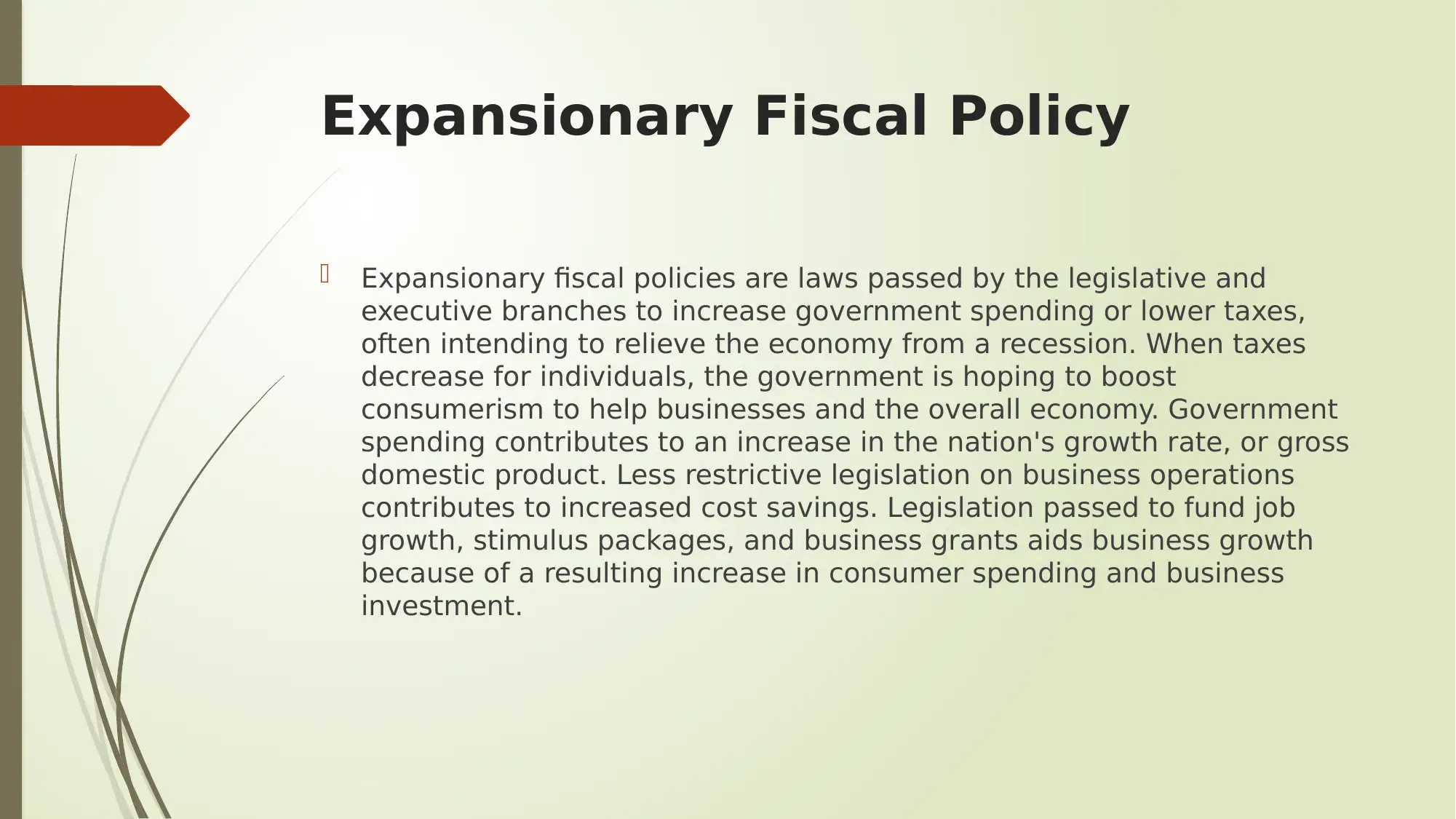
Expansionary Fiscal Policy
Expansionary fiscal policies are laws passed by the legislative and
executive branches to increase government spending or lower taxes,
often intending to relieve the economy from a recession. When taxes
decrease for individuals, the government is hoping to boost
consumerism to help businesses and the overall economy. Government
spending contributes to an increase in the nation's growth rate, or gross
domestic product. Less restrictive legislation on business operations
contributes to increased cost savings. Legislation passed to fund job
growth, stimulus packages, and business grants aids business growth
because of a resulting increase in consumer spending and business
investment.
Expansionary fiscal policies are laws passed by the legislative and
executive branches to increase government spending or lower taxes,
often intending to relieve the economy from a recession. When taxes
decrease for individuals, the government is hoping to boost
consumerism to help businesses and the overall economy. Government
spending contributes to an increase in the nation's growth rate, or gross
domestic product. Less restrictive legislation on business operations
contributes to increased cost savings. Legislation passed to fund job
growth, stimulus packages, and business grants aids business growth
because of a resulting increase in consumer spending and business
investment.
⊘ This is a preview!⊘
Do you want full access?
Subscribe today to unlock all pages.

Trusted by 1+ million students worldwide
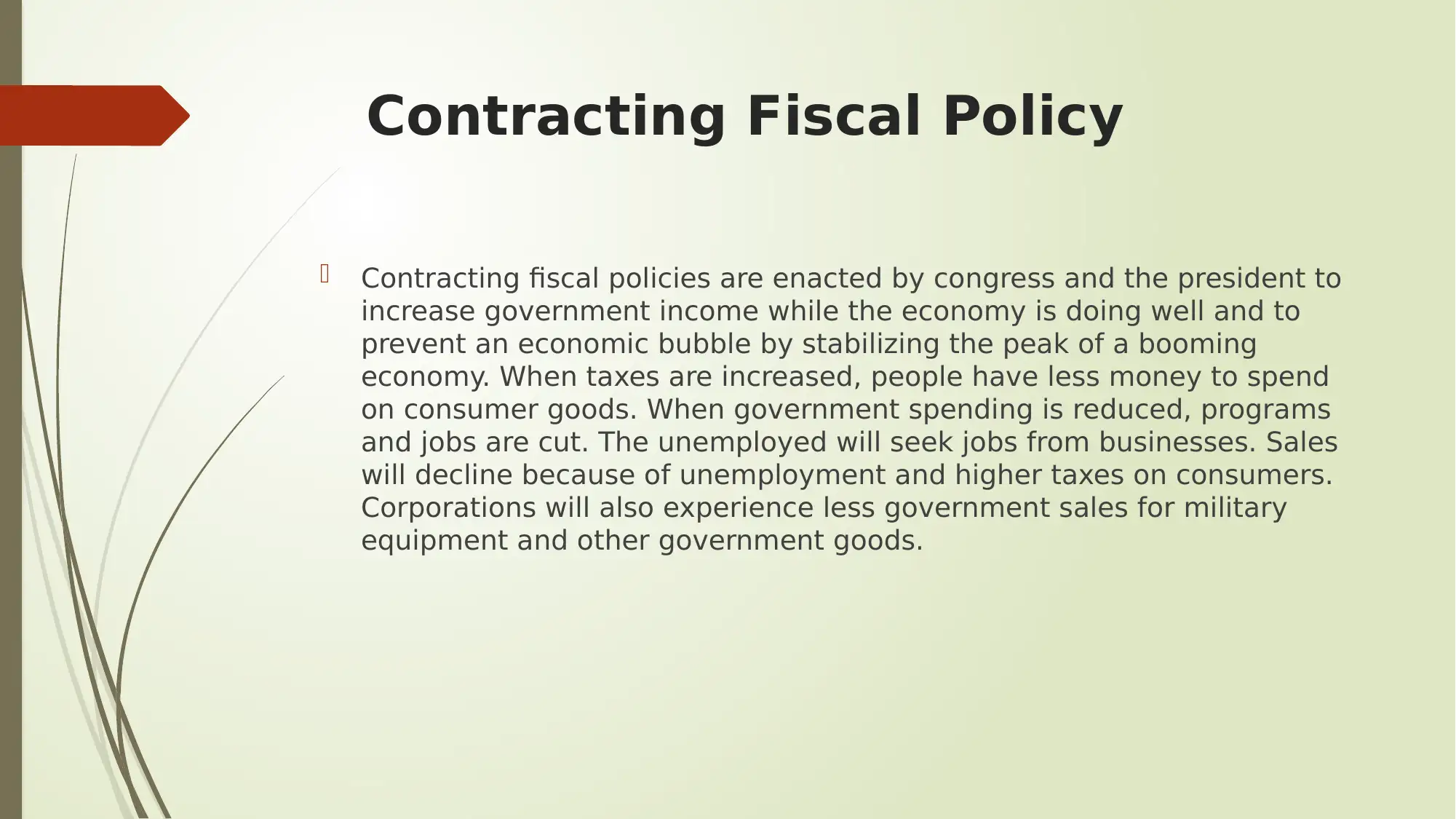
Contracting Fiscal Policy
Contracting fiscal policies are enacted by congress and the president to
increase government income while the economy is doing well and to
prevent an economic bubble by stabilizing the peak of a booming
economy. When taxes are increased, people have less money to spend
on consumer goods. When government spending is reduced, programs
and jobs are cut. The unemployed will seek jobs from businesses. Sales
will decline because of unemployment and higher taxes on consumers.
Corporations will also experience less government sales for military
equipment and other government goods.
Contracting fiscal policies are enacted by congress and the president to
increase government income while the economy is doing well and to
prevent an economic bubble by stabilizing the peak of a booming
economy. When taxes are increased, people have less money to spend
on consumer goods. When government spending is reduced, programs
and jobs are cut. The unemployed will seek jobs from businesses. Sales
will decline because of unemployment and higher taxes on consumers.
Corporations will also experience less government sales for military
equipment and other government goods.
Paraphrase This Document
Need a fresh take? Get an instant paraphrase of this document with our AI Paraphraser
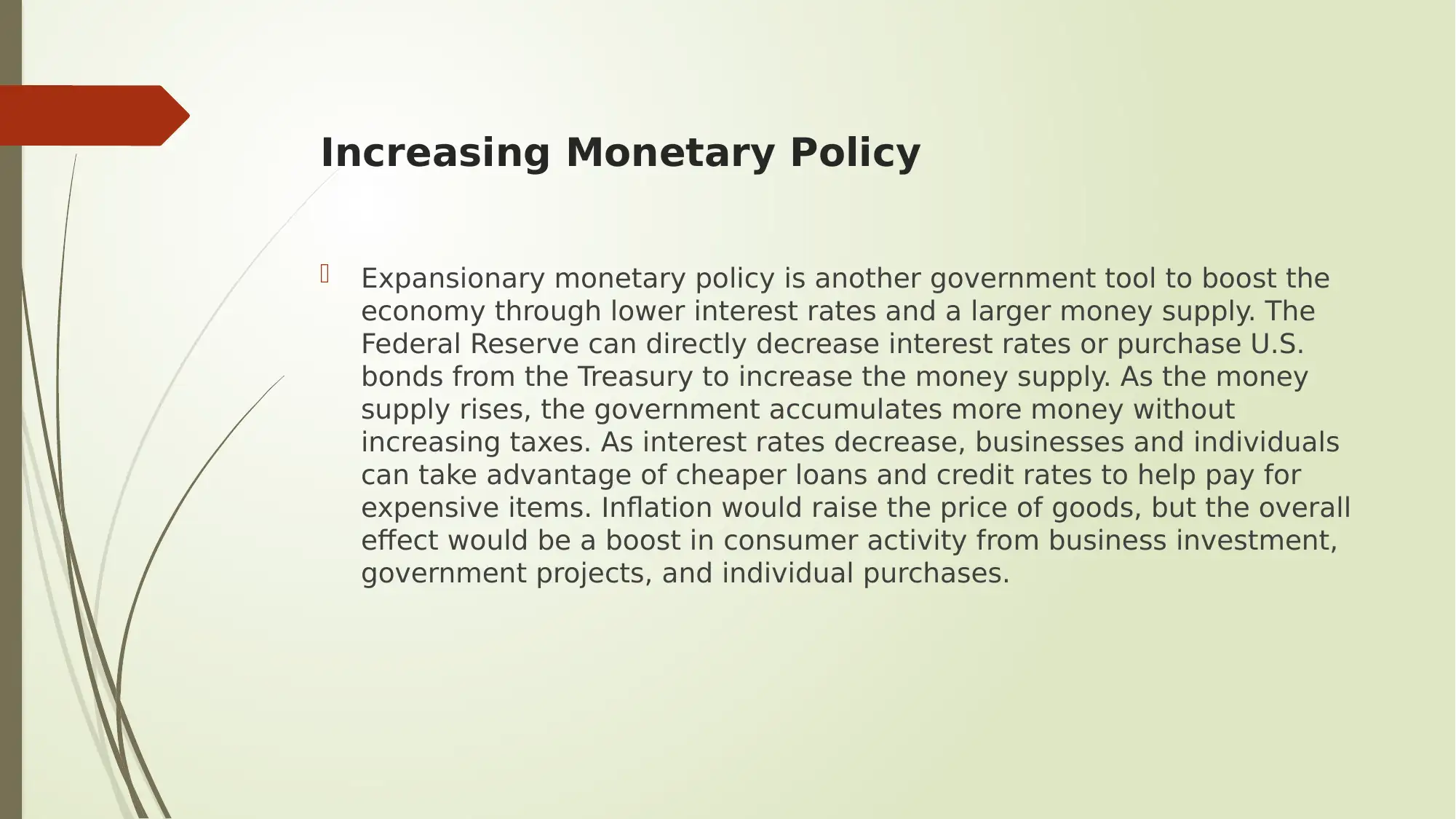
Increasing Monetary Policy
Expansionary monetary policy is another government tool to boost the
economy through lower interest rates and a larger money supply. The
Federal Reserve can directly decrease interest rates or purchase U.S.
bonds from the Treasury to increase the money supply. As the money
supply rises, the government accumulates more money without
increasing taxes. As interest rates decrease, businesses and individuals
can take advantage of cheaper loans and credit rates to help pay for
expensive items. Inflation would raise the price of goods, but the overall
effect would be a boost in consumer activity from business investment,
government projects, and individual purchases.
Expansionary monetary policy is another government tool to boost the
economy through lower interest rates and a larger money supply. The
Federal Reserve can directly decrease interest rates or purchase U.S.
bonds from the Treasury to increase the money supply. As the money
supply rises, the government accumulates more money without
increasing taxes. As interest rates decrease, businesses and individuals
can take advantage of cheaper loans and credit rates to help pay for
expensive items. Inflation would raise the price of goods, but the overall
effect would be a boost in consumer activity from business investment,
government projects, and individual purchases.
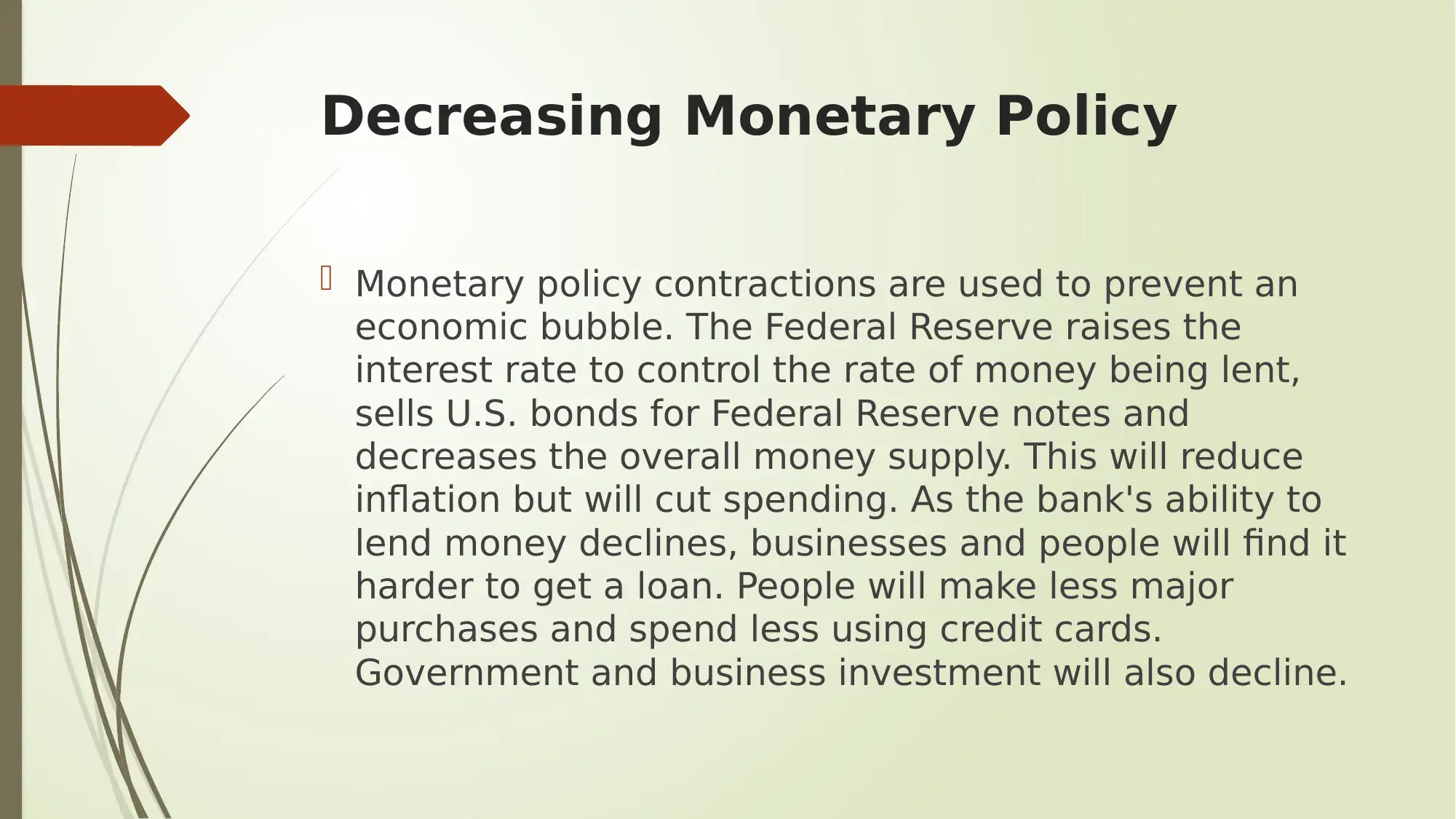
Decreasing Monetary Policy
Monetary policy contractions are used to prevent an
economic bubble. The Federal Reserve raises the
interest rate to control the rate of money being lent,
sells U.S. bonds for Federal Reserve notes and
decreases the overall money supply. This will reduce
inflation but will cut spending. As the bank's ability to
lend money declines, businesses and people will find it
harder to get a loan. People will make less major
purchases and spend less using credit cards.
Government and business investment will also decline.
Monetary policy contractions are used to prevent an
economic bubble. The Federal Reserve raises the
interest rate to control the rate of money being lent,
sells U.S. bonds for Federal Reserve notes and
decreases the overall money supply. This will reduce
inflation but will cut spending. As the bank's ability to
lend money declines, businesses and people will find it
harder to get a loan. People will make less major
purchases and spend less using credit cards.
Government and business investment will also decline.
⊘ This is a preview!⊘
Do you want full access?
Subscribe today to unlock all pages.

Trusted by 1+ million students worldwide
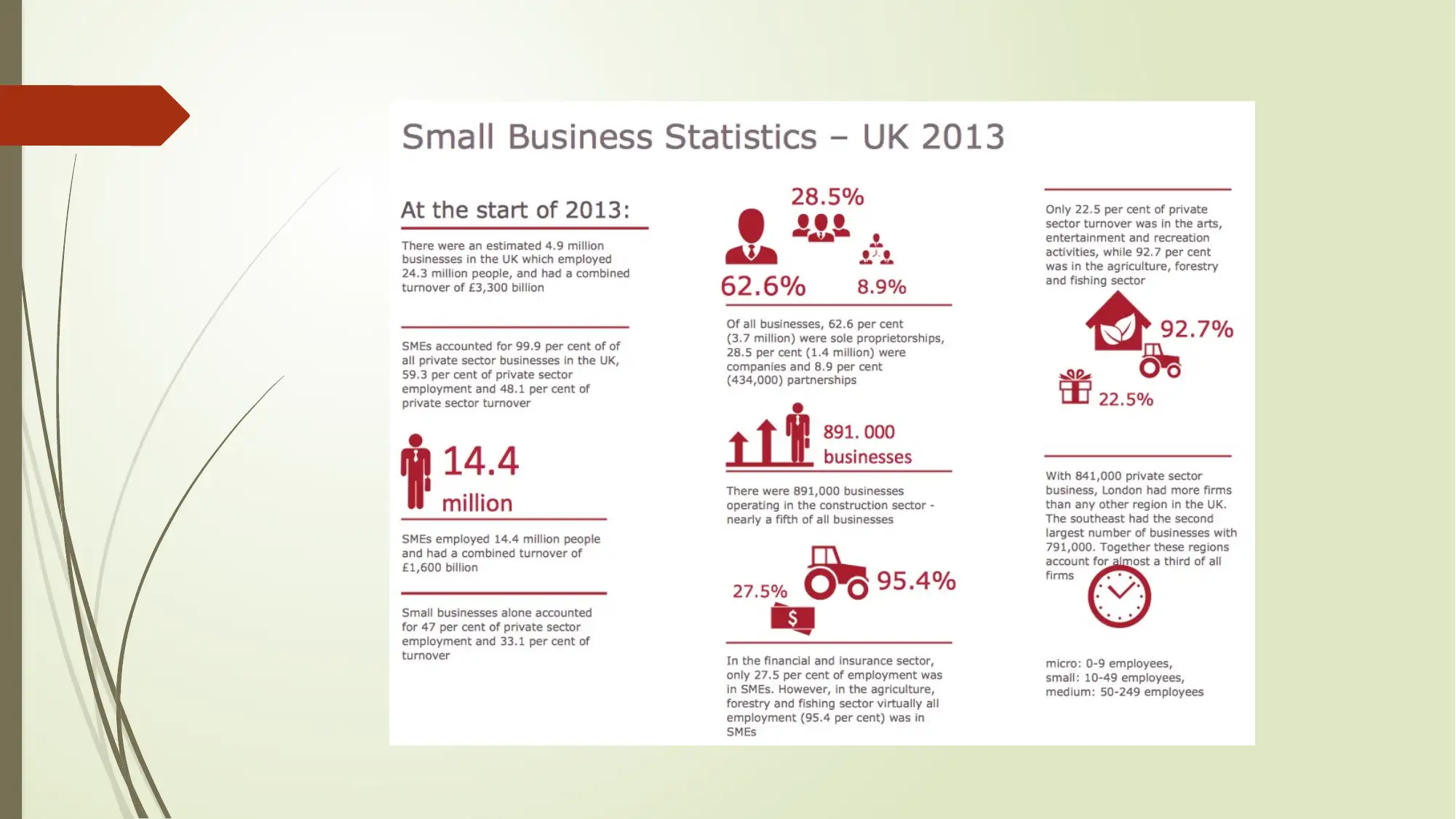
Paraphrase This Document
Need a fresh take? Get an instant paraphrase of this document with our AI Paraphraser
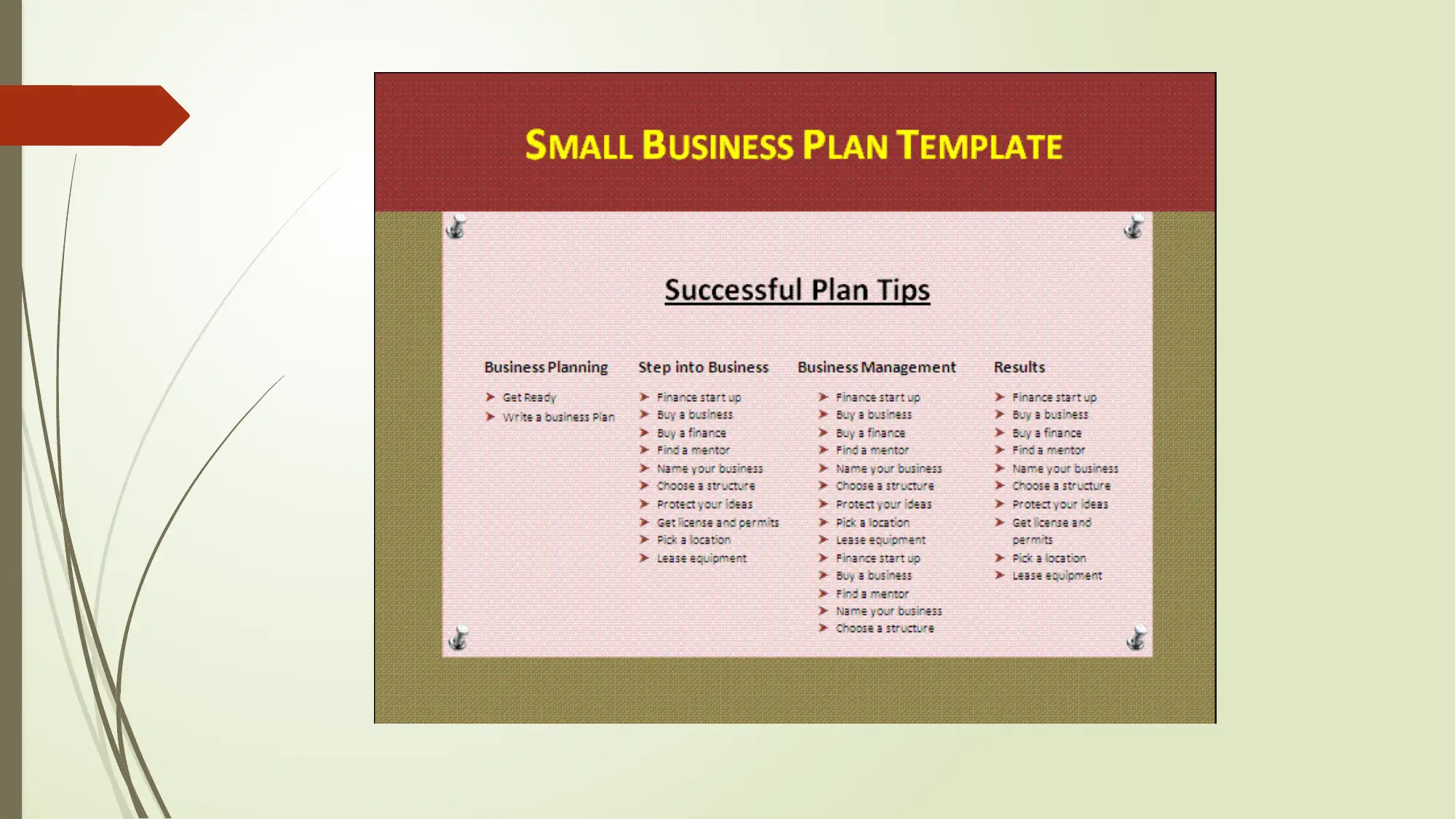
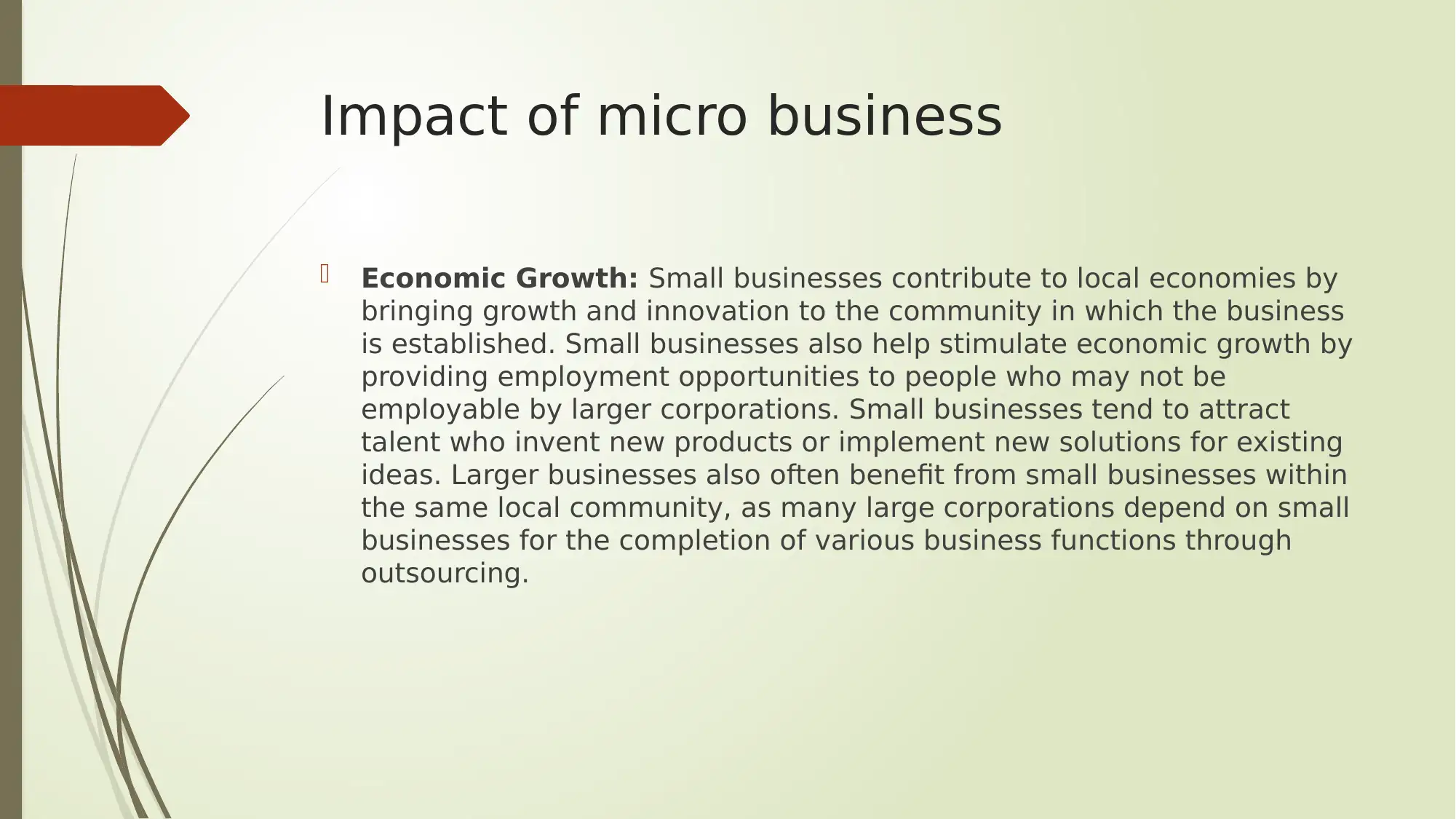
Impact of micro business
Economic Growth: Small businesses contribute to local economies by
bringing growth and innovation to the community in which the business
is established. Small businesses also help stimulate economic growth by
providing employment opportunities to people who may not be
employable by larger corporations. Small businesses tend to attract
talent who invent new products or implement new solutions for existing
ideas. Larger businesses also often benefit from small businesses within
the same local community, as many large corporations depend on small
businesses for the completion of various business functions through
outsourcing.
Economic Growth: Small businesses contribute to local economies by
bringing growth and innovation to the community in which the business
is established. Small businesses also help stimulate economic growth by
providing employment opportunities to people who may not be
employable by larger corporations. Small businesses tend to attract
talent who invent new products or implement new solutions for existing
ideas. Larger businesses also often benefit from small businesses within
the same local community, as many large corporations depend on small
businesses for the completion of various business functions through
outsourcing.
⊘ This is a preview!⊘
Do you want full access?
Subscribe today to unlock all pages.

Trusted by 1+ million students worldwide
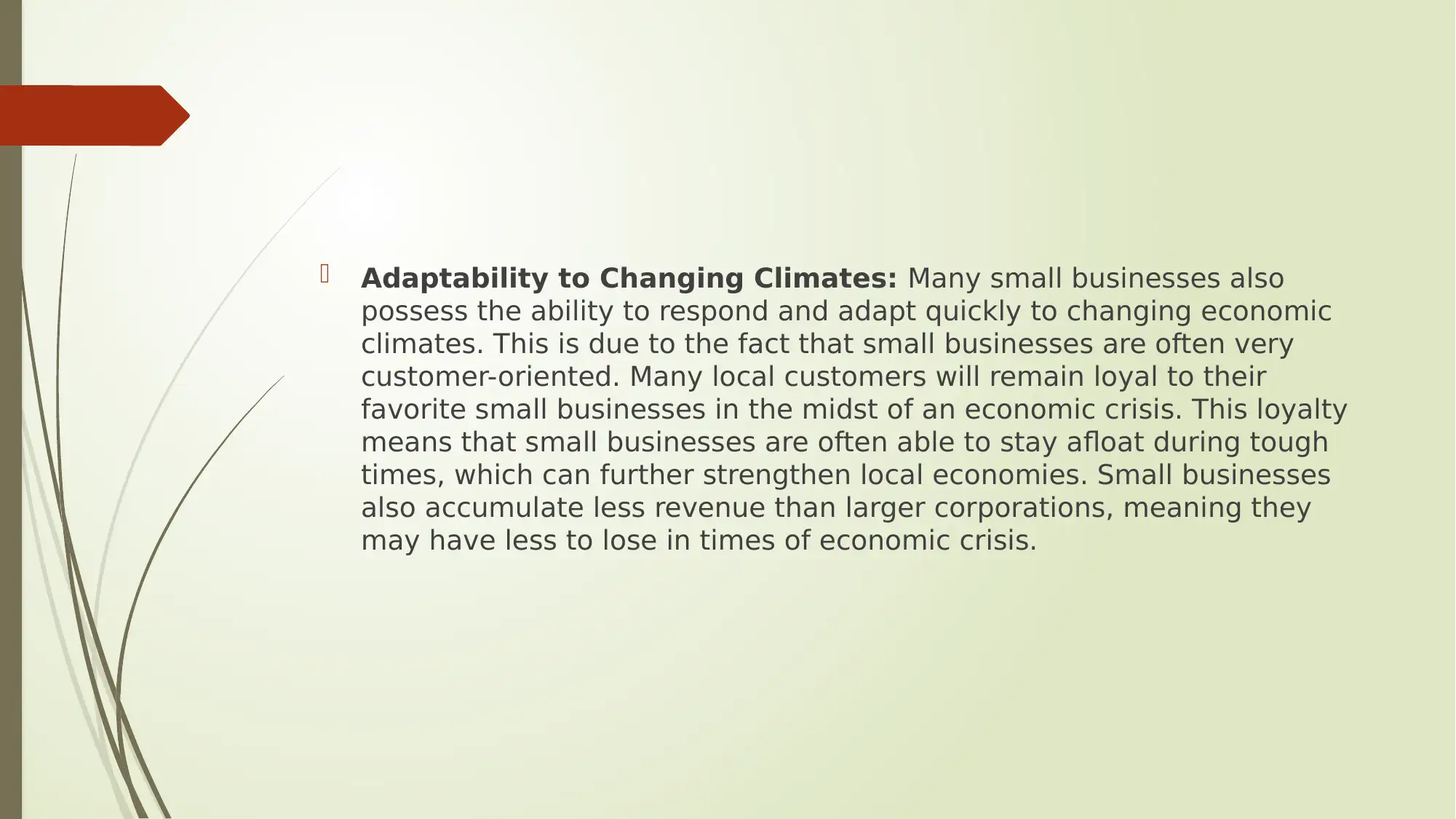
Adaptability to Changing Climates: Many small businesses also
possess the ability to respond and adapt quickly to changing economic
climates. This is due to the fact that small businesses are often very
customer-oriented. Many local customers will remain loyal to their
favorite small businesses in the midst of an economic crisis. This loyalty
means that small businesses are often able to stay afloat during tough
times, which can further strengthen local economies. Small businesses
also accumulate less revenue than larger corporations, meaning they
may have less to lose in times of economic crisis.
possess the ability to respond and adapt quickly to changing economic
climates. This is due to the fact that small businesses are often very
customer-oriented. Many local customers will remain loyal to their
favorite small businesses in the midst of an economic crisis. This loyalty
means that small businesses are often able to stay afloat during tough
times, which can further strengthen local economies. Small businesses
also accumulate less revenue than larger corporations, meaning they
may have less to lose in times of economic crisis.
Paraphrase This Document
Need a fresh take? Get an instant paraphrase of this document with our AI Paraphraser
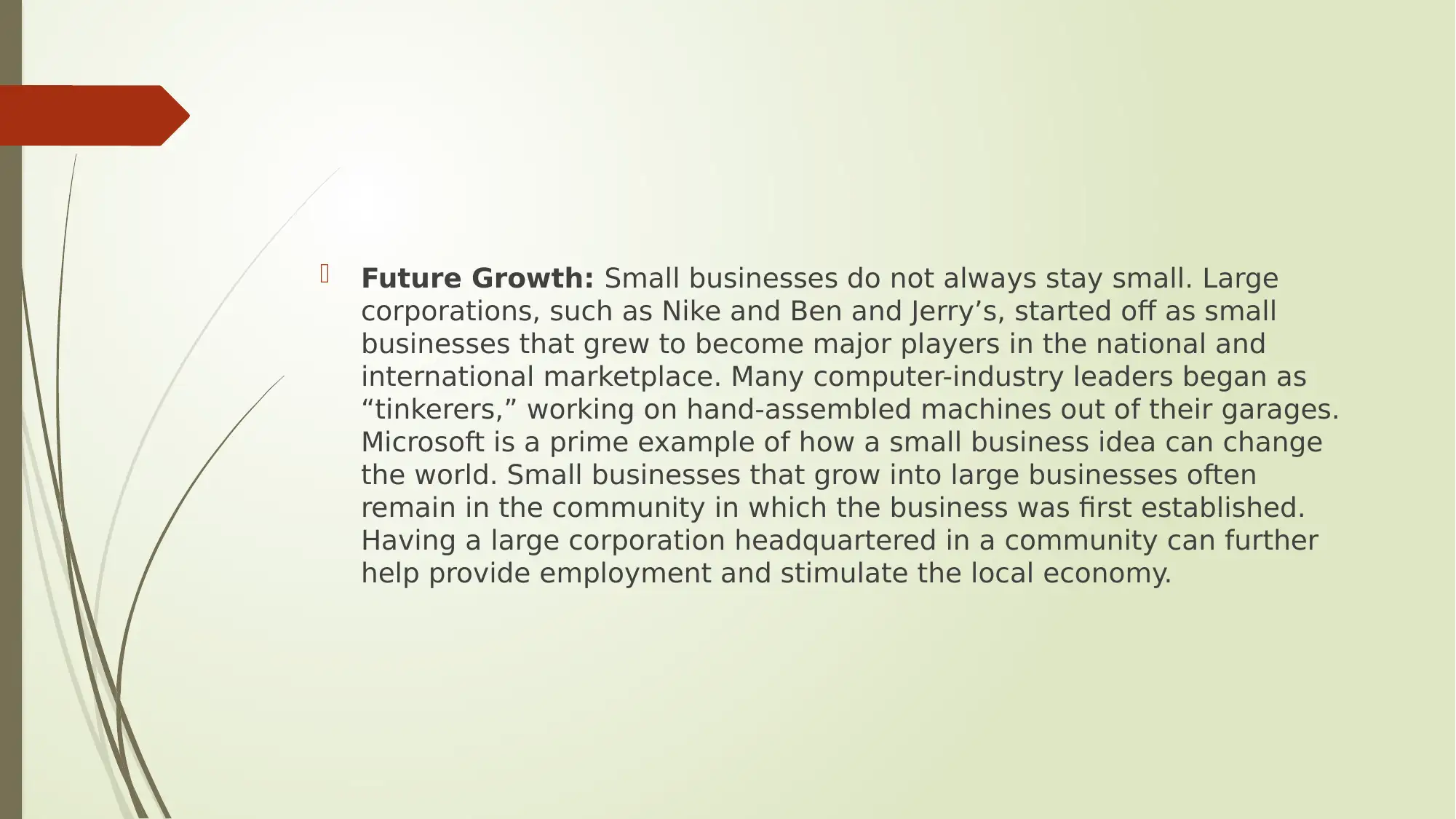
Future Growth: Small businesses do not always stay small. Large
corporations, such as Nike and Ben and Jerry’s, started off as small
businesses that grew to become major players in the national and
international marketplace. Many computer-industry leaders began as
“tinkerers,” working on hand-assembled machines out of their garages.
Microsoft is a prime example of how a small business idea can change
the world. Small businesses that grow into large businesses often
remain in the community in which the business was first established.
Having a large corporation headquartered in a community can further
help provide employment and stimulate the local economy.
corporations, such as Nike and Ben and Jerry’s, started off as small
businesses that grew to become major players in the national and
international marketplace. Many computer-industry leaders began as
“tinkerers,” working on hand-assembled machines out of their garages.
Microsoft is a prime example of how a small business idea can change
the world. Small businesses that grow into large businesses often
remain in the community in which the business was first established.
Having a large corporation headquartered in a community can further
help provide employment and stimulate the local economy.
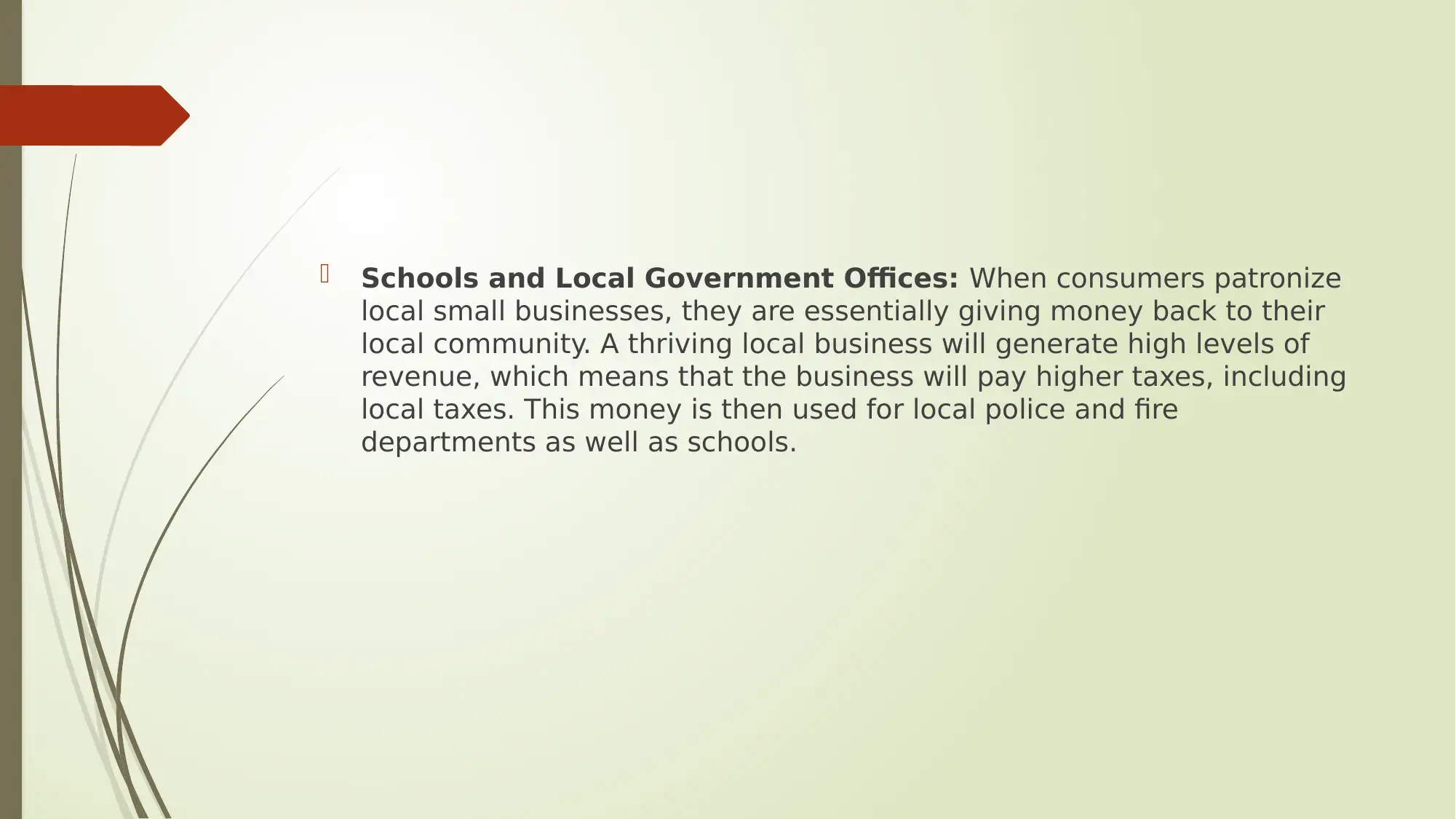
Schools and Local Government Offices: When consumers patronize
local small businesses, they are essentially giving money back to their
local community. A thriving local business will generate high levels of
revenue, which means that the business will pay higher taxes, including
local taxes. This money is then used for local police and fire
departments as well as schools.
local small businesses, they are essentially giving money back to their
local community. A thriving local business will generate high levels of
revenue, which means that the business will pay higher taxes, including
local taxes. This money is then used for local police and fire
departments as well as schools.
⊘ This is a preview!⊘
Do you want full access?
Subscribe today to unlock all pages.

Trusted by 1+ million students worldwide
1 out of 20
Related Documents
Your All-in-One AI-Powered Toolkit for Academic Success.
+13062052269
info@desklib.com
Available 24*7 on WhatsApp / Email
![[object Object]](/_next/static/media/star-bottom.7253800d.svg)
Unlock your academic potential
Copyright © 2020–2026 A2Z Services. All Rights Reserved. Developed and managed by ZUCOL.





